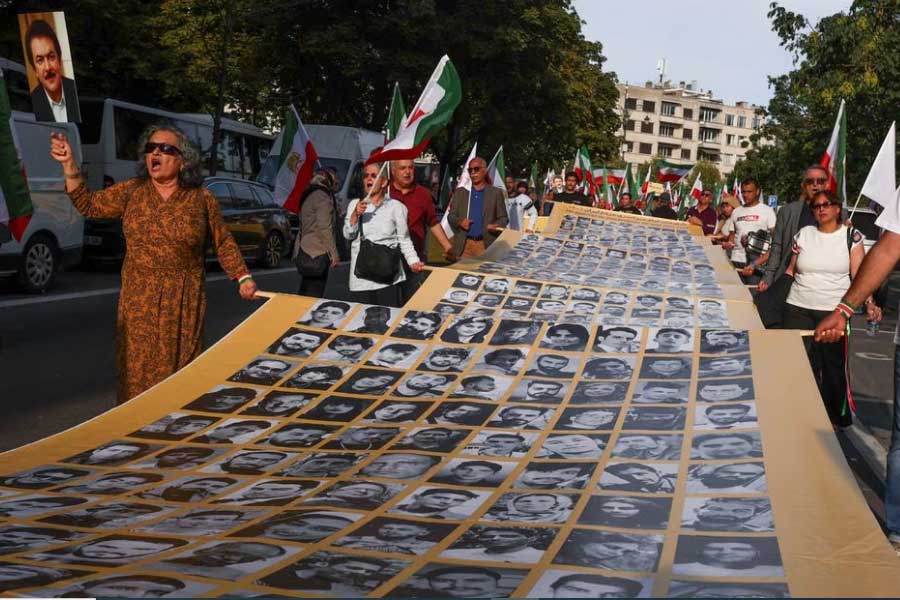Iran’s security forces crack down on protests a year after Mahsa Amini’s death

Published :
Updated :

Iranian security forces cracked down on protests in Kurdish areas of the country on Saturday and briefly detained the father of Mahsa Amini, a year after the young woman's death in custody set off some of the worst political unrest in four decades.
The Revolutionary Guards detained a dual national suspected of "trying to organise unrest and sabotage", the official news agency IRNA reported, one of several arrests of "counter revolutionaries" and "terrorists" reported.
As night fell on Saturday, a heavy security force presence in Iran's mostly Kurdish areas appeared to have deterred large-scale protest rallies but human rights groups reported sporadic confrontations in several areas of the country.
The death of Mahsa Amini, a 22-year-old Kurdish woman arrested by the morality police last year for allegedly flouting mandatory dress codes, triggered months of some of the biggest protests against the Islamic Republic's Shi'ite clerical rule ever seen and drew international condemnation.
Despite the heavy security presence on Saturday, there were indications of protest actions at various points around the country. Videos posted on social media showed people gathered on a main avenue in the capital Tehran cheering a young protesting couple as drivers honked their car horns in support.
IRNA reported that fire engulfed the women's ward at the Qarchak prison in Tehran province before being put out after convicts awaiting execution set fire to their clothes. It said there were no casualties.
The Kurdistan Human Rights Network, which said the incident was linked to the protests, said special forces entered the ward, beat up the women and fired pellet bullets.
In a separate incident, human rights group Hengaw said security forces opened fire in the Kurdish city of Mahabad, wounding at least one person. It also said several people were wounded in the city of Kermanshah but there was no official confirmation of either incident.
In Amini's home town of Saqez, in northwestern Iran, the semi-official Fars news agency reported that police using a pellet gun had seriously injured a man who "ignored a police warning". It said the man was in an intensive care ward after undergoing an operation, but provided no more detail.
Social media postings also carried footage of residents of cities including Tehran shouting slogans against Supreme leader Ayatollah Ali Khamenei such as "Death to the Dictator!" as well as protests in areas including Gohardasht, in the city of Karaj west of Tehran, and in Mashhad in the northeast.
One video posted on social media showed a group of demonstrators in Gohardasht chanting "We are a great nation, and will take back Iran" while drivers honked their horns and shouted encouragement. Reuters could not immediately authenticate the video.
In the demonstrations that followed Amini's death more than 500 people, including 71 minors, were killed, hundreds injured and thousands arrested, rights groups said. Iran carried out seven executions linked to the unrest.
On Saturday, Mahsa's father, Amjad Amini, was warned against marking the anniversary of his daughter's death before being released, the Kurdistan Human Rights Network said, and the family was not able to hold a planned vigil at her graveside.
IRNA denied in a report that Amjad Amini had been arrested, but it did not say whether he was briefly detained or warned.
Earlier, social media and reports by rights groups spoke of security forces taking up positions around Amini's home in Saqez, in western Iran.
'HISTORIC MOVEMENT'
The crackdown on protests came as the condemnation by the United Nations nuclear watchdog of Tehran's decision to bar several inspectors from the country underlined Iran's isolation from the West.
In Washington, hundreds of protesters gathered in a park across from the White House holding portraits of Amini. Speakers led the crowd in chants of "Say her name ... Mahsa Amini," and also recited "We are the revolution" and "Human rights for Iran!"
In a statement on Friday, US President Joe Biden said: "Mahsa's story did not end with her brutal death. She inspired a historic movement — Woman, Life, Freedom — that has impacted Iran and influenced people across the globe."
Britain on Friday imposed sanctions on four Iranian officials and the US said it was sanctioning more than two dozen individuals and entities connected to Iran's "violent suppression" of protests.
Without naming Biden, Iran's Foreign Ministry spokesperson Nasser Kanaani rejected as "double standards and lies" Western expressions of support for women's rights in Iran.
State media also dismissed reports of disturbances and strikes in multiple cities in Iran's Kurdistan region. IRNA said Saqez was "completely quiet" and that calls for strikes in Kurdish areas had failed due to "people's vigilance and the presence of security and military forces".
The agency quoted an official in the Kurdistan province as saying: "A number of agents affiliated with counter-revolutionary groups who had planned to create chaos and prepare media fodder were arrested in the early hours of this morning."
In a report last month, Amnesty International said Iranian authorities "have been subjecting victims' families to arbitrary arrest and detention, imposing cruel restrictions on peaceful gatherings at grave sites, and destroying victims' gravestones".
Many journalists, lawyers, activists, students, academics, artists, public figures and members of ethnic minorities accused of links with the protest wave, as well as relatives of protesters killed in the unrest, have been arrested, summoned, threatened or fired from jobs in the past few weeks, according to Iranian and Western human rights groups.
Iran's Etemad daily reported in August that the lawyer for Amini's family also faced charges of "propaganda against the system". If convicted, Saleh Nikbakht faces a jail sentence of between one and three years.


 For all latest news, follow The Financial Express Google News channel.
For all latest news, follow The Financial Express Google News channel.